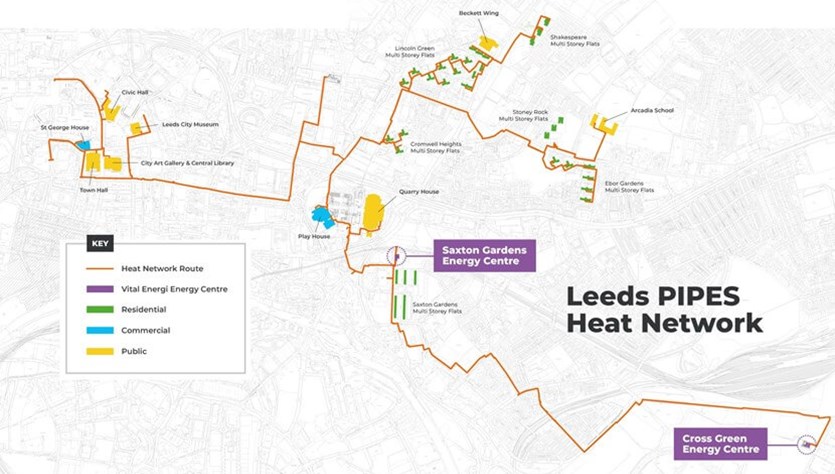With the UK Government due to introduce its Heat Network Zoning legislation in 2025, Leeds City Council is already ahead of the game, thanks to its partnership with Vital Energi to create the ‘Leeds PIPES’ district heating network. The project stands out for its unprecedented speed of deployment and scale of expansion. Recovering heat from an energy-from-waste plant has allowed the council to cut the city’s carbon footprint, while at the same time helping to tackle fuel poverty and improving air quality, by rolling out in just two years, a system that’s taken other cities decades to build. Vital Energi’s mastery of data analysis has helped the network to expand at a rapid pace.

Under the streets of Leeds lie 30 kilometres of underground insulated pipes carrying one million litres of hot water to heat the city’s homes, businesses, and public buildings. The heat network – named ‘Leeds Providing Innovative Pro-Environment Solutions’ or ‘Leeds PIPES’ by Year 9 pupils at the local Co-operative Academy – is not only reducing the city’s carbon dioxide emissions but also lowering fuel bills for consumers and improving air quality.
The speed and scale of deployment set Leeds PIPES apart from other UK district heating schemes. While it's taken some cities decades to reach 40km of network coverage, Leeds PIPES hit the 30km mark in just six years. The network now serves more than 4,100 homes and connects 29 non-residential buildings, with significant potential for further expansion as it currently operates at 12MW of its 33MW capacity.
The project's success stems from Leeds City Council's strategic vision and Vital Energi's innovative approach to network design and expansion. The initial phase focused on creating two energy centres - one at Cross Green near the Leeds Recycling and Energy Recovery Facility (RERF), which is a waste to energy plant, to convert steam into hot water, and another at Saxton Gardens, housing backup gas boilers for network resilience.
As part of a value-engineering exercise, Vital Energi identified opportunities for significant efficiency improvements by proposing an alternative network design. By positioning the main infrastructure at Saxton Gardens instead of Cross Green, the team reduced the need for satellite energy centres while maintaining network resilience. This also allowed for the optimisation of pipe sizes throughout the project.
Using prefabricated pipework modules and assemblies enabled the Cross Green energy centre to be completed ahead of schedule. Having a large in-house design team meant that Vital Energi had the know-how and expertise to support the council and its planning department with all of the information needed to quickly update the planning applications and environmental surveys previously undertaken.
The second phase of the project involved extending Leeds PIPES along The Headrow, one of the main thoroughfares running east to west through the city centre, to connect non-residential buildings, including the Town Hall, the Art Gallery, and Civic Hall.
Further phases have seen us connect Leeds Beckett University, the Combined and Magistrates’ Courts and St James’s Hospital. Additional expansions have connected three high-rise blocks, totalling 393 homes.
This impressive growth can be attributed to the strategic foundations laid during the project’s initial planning stages.
One key factor in the network's rapid expansion has been Vital Energi's data-driven approach to system design and optimisation. Drawing on over one billion real-world data points, we create highly accurate energy models that inform design, construction, and maintenance decisions. This evidence-based approach allows for maximum heat generation efficiency while minimising carbon emissions.